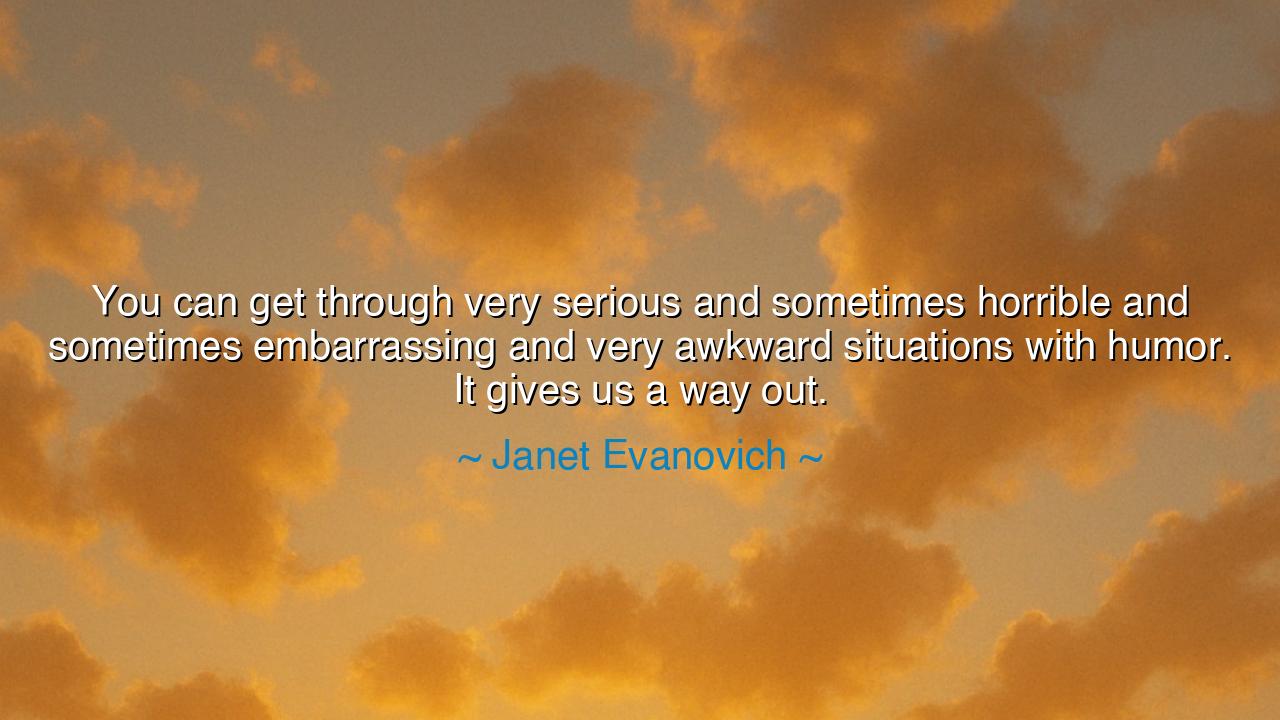
You can get through very serious and sometimes horrible and
You can get through very serious and sometimes horrible and sometimes embarrassing and very awkward situations with humor. It gives us a way out.






Listen, O seekers of wisdom, to the words of Janet Evanovich, whose insight touches upon an ancient truth: "You can get through very serious and sometimes horrible and sometimes embarrassing and very awkward situations with humor. It gives us a way out." These words are not mere musings on the lightness of laughter but a profound understanding of humor’s role in navigating the heavy burdens of life. For humor is more than a source of mirth—it is a weapon in our emotional arsenal, a shield that protects us when the weight of life's challenges threatens to overwhelm us.
In the ancient world, the greatest warriors and leaders understood that in times of crisis, humor could provide a moment of relief, a breath of air that lifted the soul from the depths of despair. Consider Homer's Iliad, a work that recounts the horrors of war, yet within its pages, there are moments of lightness—moments when the gods themselves playfully interact, showing that even amidst the bloodshed and sorrow, there is room for wit and jest. In these fleeting moments, the warriors are reminded of their humanity, of the fact that life is not merely about struggle, but about finding balance, about using humor to keep the spirit alive. Humor is the gift that allows us to find strength in the face of hardship, to see the absurdity in even the darkest of times.
Let us recall the story of Socrates, the philosopher who, despite facing trial and the prospect of death, did not abandon his sense of humor. He was known for his ability to speak with wit, even when confronting the most serious of matters. In his dialogues, humor was a tool—not to trivialize the truth, but to reveal it, to make it palatable, to allow his listeners to digest the profound teachings he offered. When confronted with the accusations of corrupting the youth, Socrates did not respond with anger or despair; instead, he employed humor to reveal the folly of those who sought to silence him. In this way, humor gave him a way out of the suffocating grip of fear and allowed him to remain true to his mission.
Humor also served the greatest leaders of history in their most awkward and trying moments. Take Queen Elizabeth I, for instance, a ruler who faced not only the pressure of leadership but also the humiliation of being a woman in a world dominated by men. When confronted by threats to her rule and challenged by the fears of her court, Elizabeth wielded humor as a way to disarm her enemies and to calm the tensions around her. Her wit was legendary; she could defuse political tension with a clever remark, turning a potentially disastrous situation into one of grace and ease. In moments of embarrassment or discomfort, her humor allowed her to regain control and assert her authority.
In the same vein, Janet Evanovich speaks of the ability to use humor as a way out of uncomfortable and awkward situations. It is a profound truth that in moments when we are vulnerable—when the weight of failure or embarrassment presses down on us—humor offers a path to freedom. It grants us the power to laugh at ourselves, to see the absurdity in our own mistakes, and to find light even in the darkest corners of our existence. Through laughter, we can transcend our awkwardness, for humor creates a distance between us and our suffering, allowing us to move forward with grace rather than shame.
Consider the great example of Winston Churchill, whose leadership during the darkest days of World War II was marked by his sharp wit and ability to turn the tide of despair with a well-timed joke. When the bombs fell, and Britain seemed on the verge of collapse, Churchill’s humor reminded the people that even in the face of destruction, they were not defeated. His humor became a symbol of resilience, a rallying cry that, despite the horror surrounding them, the people could still laugh, could still find moments of joy amidst the chaos. Humor, for Churchill, was not just a diversion; it was a vital tool in the battle for the soul of his nation.
So, too, must we carry this lesson forward in our own lives. When the world feels heavy, when awkwardness and embarrassment threaten to consume us, we must remember the power of humor. It is not a tool to avoid responsibility, nor is it a way to belittle our struggles, but rather a means of confronting them with clarity and strength. Humor offers us perspective, it reminds us of the absurdity of life, and in that reminder, we find the courage to move through our serious moments with dignity and poise. It is the way out of darkness, the bridge that leads us back to the light, and the balm that soothes the wounds of awkwardness.
Therefore, take these teachings to heart, O generations of wisdom: when life grows heavy and awkward, turn to humor as a guide. Laugh at the absurdity of your own shortcomings, for in doing so, you release the tension that binds you to the shame of failure. Remember the ancient wisdom, the stories of warriors, philosophers, and rulers who knew that humor is not a diversion from life, but a powerful force that helps us navigate its most difficult trials. Use humor not just to escape, but to transform, and you will find that even in the darkest moments, there is always a way forward.






AAdministratorAdministrator
Welcome, honored guests. Please leave a comment, we will respond soon